Global Volunteer Action
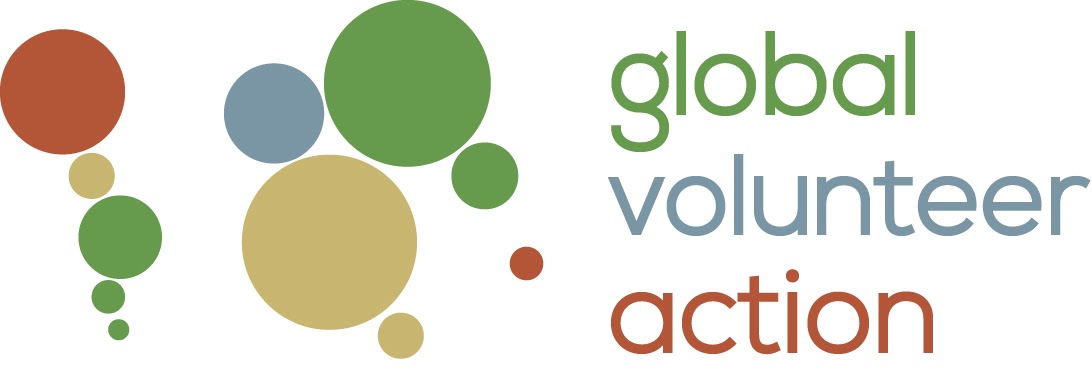
March 2015 - June 2016
The idea
Global Volunteer Action focused on youth volunteering, specifically in Europe and Asia. Youth and voluntary service organizations faced several challenges, and Global Volunteer Action aimed to find a common space where they could be shared and discussed, a space that could provide and create common solutions.
The project worked towards the following objectives:
1
improving networking, communication and cooperation among SCI branches and partners in Europe and Asia active in international voluntary service
2
promoting non-formal and informal learning opportunities for young people through international voluntary service in both Europe and Asia (in particular on the topics of intercultural dialogue and solidarity), active citizenship and common global issues as social inclusion, youth employment, global environmental challenges and other
3
increasing visibility and recognition of international volunteer and youth activities by better use of online and social media tools on both national and international level, innovative and creative approaches in organizing international youth and volunteer activities
4
increasing quality of awareness raising and educational activities in international youth and volunteer projects by training multipliers, preparing, sharing and improving materials for non-formal education
The activities
The project consisted of different meetings, seminars and trainings:
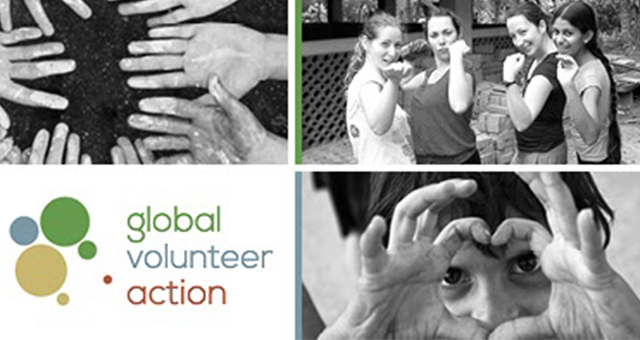
Preparatory Meeting
Rome (Italy), 26 – 29 March 2015
The preparation team met in person to plan the following activities.
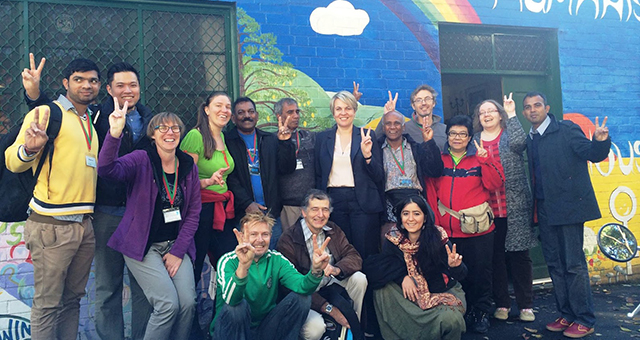
Global Volunteer Action Opening Seminar: Volunteering in the 21st Century in Asia
Sydney (Australia), 22 – 27 June 2015
The seminar consisted of two days of seminar and two and a half days of capacity building and strategic planning. It also provided an opportunity for members of the IEC and representatives of 9 Asian branches to reflect on the role and organisation of volunteering today.

Volunteer University
Sofia (Bulgaria), 12 – 18 October 2015
During the Volunteer University the participants focused on exchanges of Global South and Global North. Evaluation of activities was another big theme and as an important outcome of this activity an online evaluation system of projects and best practices on workcamps within SCI was implemented in practice.
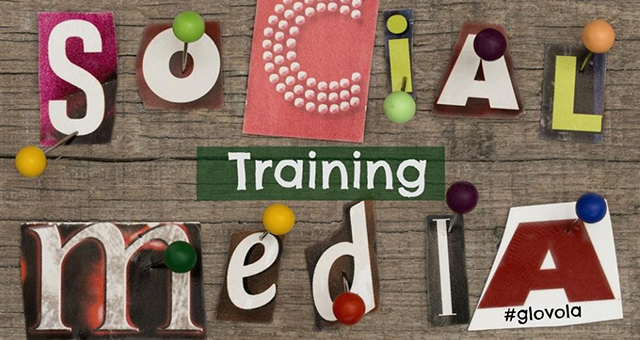
Social Media and ICT Training
Hong Kong (China), 20 – 25 February 2016
The training aimed at improving networking, communication and cooperation among SCI branches and partners in Europe and Asia active in international voluntary service. It also had the goal of increasing the visibility and recognition of international volunteer and youth activities by better use of internet and social media tools, on both national and international level.
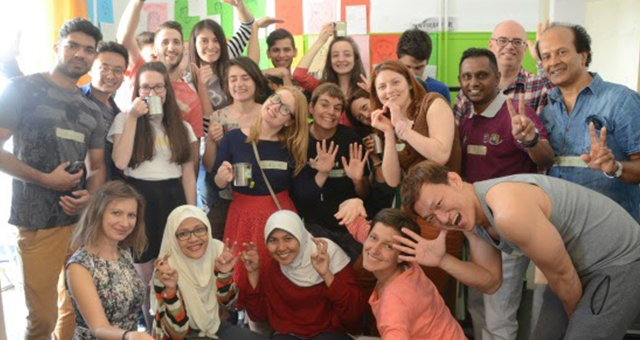
Training for multipliers working with (international) youth groups
Athens (Greece), 11 – 17 April 2016
The training gathered 22 participants from 13 different countries around the world, and prepared SCI volunteers and activists to become workcamp coordinators in various Countries.
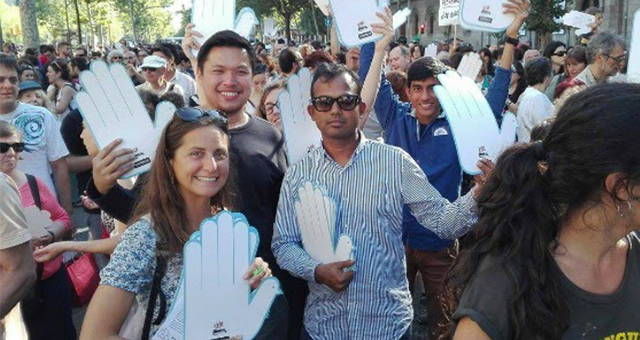
Final seminar – Advanced Volunteer University
Barcelona (Spain), 17 – 22 June 2016
The Final seminar of the Global Volunteer Action project took place at the Advanced Volunteer University and focused on a complete evaluation of this global project.
Outcomes and resources
“A public debate on International volunteering in a rapidly changing society, where experienced speakers shared their views, experiences and research findings, was an eye opener for all of us.”
Edward Chuah, participant from SCI Malaysia

Grapheazy Cards
A visual facilitation tool designed for meetings with international participants, where English is not the mother tongue of the majority of the group. Grapheazy can help people express themselves more freely during a discussion. Thanks to the power of images, this tool turns a group discussion into dynamic visualisation that can be helpful in identifying new ways to tackle a problem or a theme. Grapheazy includes 50 visual A4 – cards and a manual with examples how to use it. It was created by Mauro Carta on behalf of SCI with the support of the Pool of trainers and facilitators of SCI. After its content-testing phase in 2014, the improved tool received a fresh design and was launched at the Final Seminar – Advanced Volunteer University.
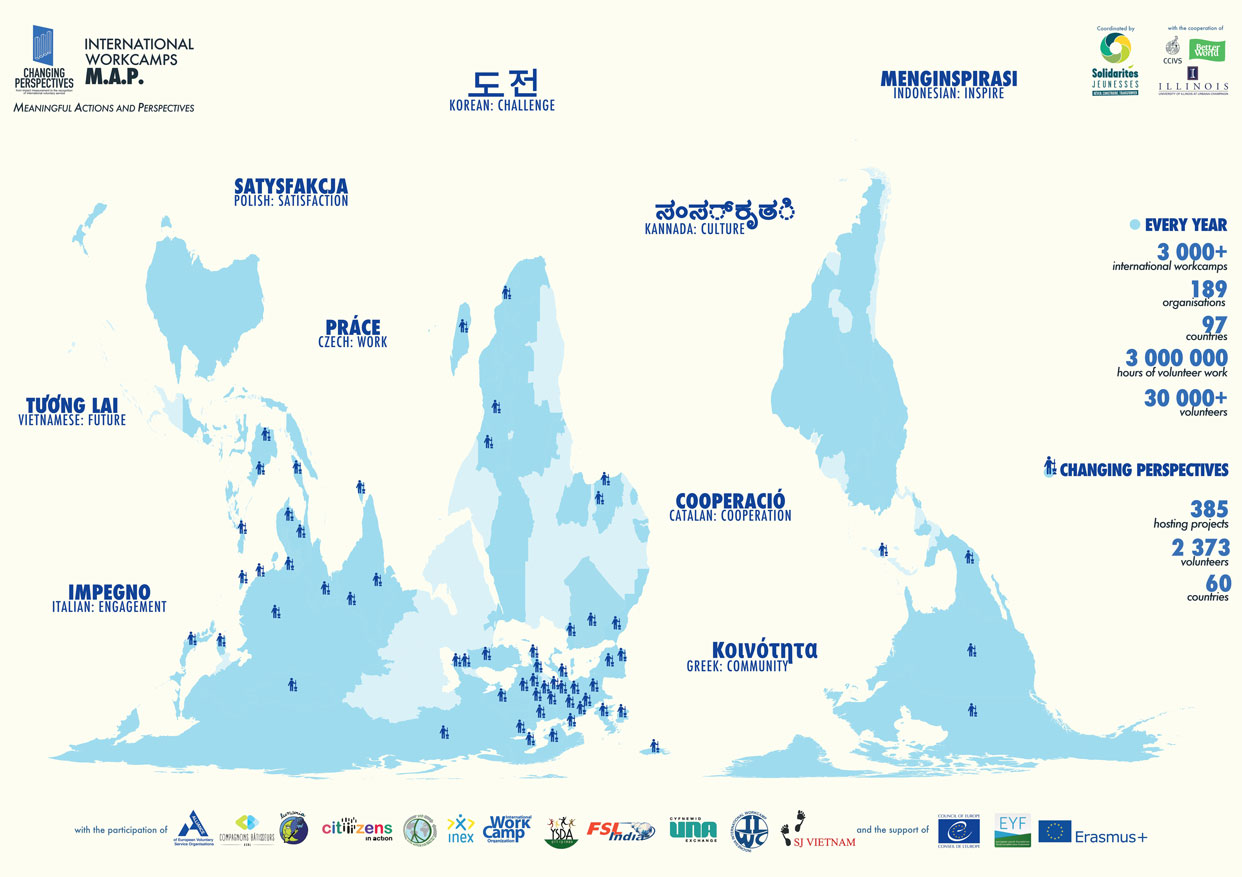
Impact map
After the introduction to a survey on international volunteering during the Opening Seminar, branches contributed to this survey in 2015. As a follow up, an Impact Map was created.
Several resources were created for improving knowledge and knowledge transfer in the Movement. You can access these resources if you are a member of SCI.
Social Media Guidelines
The participants of the Social Media and ICT training developed Social Media Guidelines to help all branches.
Educational materials for camp coordinators
Participants in the Training for multipliers working with (international) youth activities developed educational materials, namely session outlines (scenarios) for training of camp coordinators.
Question to Answer
Question to Answer, alias Q2A, is an online support forum SCI developed to facilitate better knowledge transfer within the SCI movement. Anyone can ask a question and anyone can provide an answer. The tool allows SCI newcomers to link with experienced people who can provide valuable insights on their questions.
Resolution on improving reporting by SCI branches
The Global Volunteer Action Opening seminar allowed participating organisations from Europe and Asia to meet face to face and go beyond what cooperation between Europe and Asian region means. The discussion on this topic led to a proposal of a resolution on improving reporting by SCI branches, which was approved by the International Committee Meeting later that year.
Supporters
The project was implemented with the support of the Erasmus+ programme of the European Union.

Global Volunteer Action Opening Seminar: Volunteering in the 21st Century in Asia
Sydney (Australia), 22 – 27 June 2015
The Global Volunteer Action Opening Seminar: Volunteering in the 21st Century in Asia consisted of two days of seminar and two and a half days of capacity building and strategic planning.
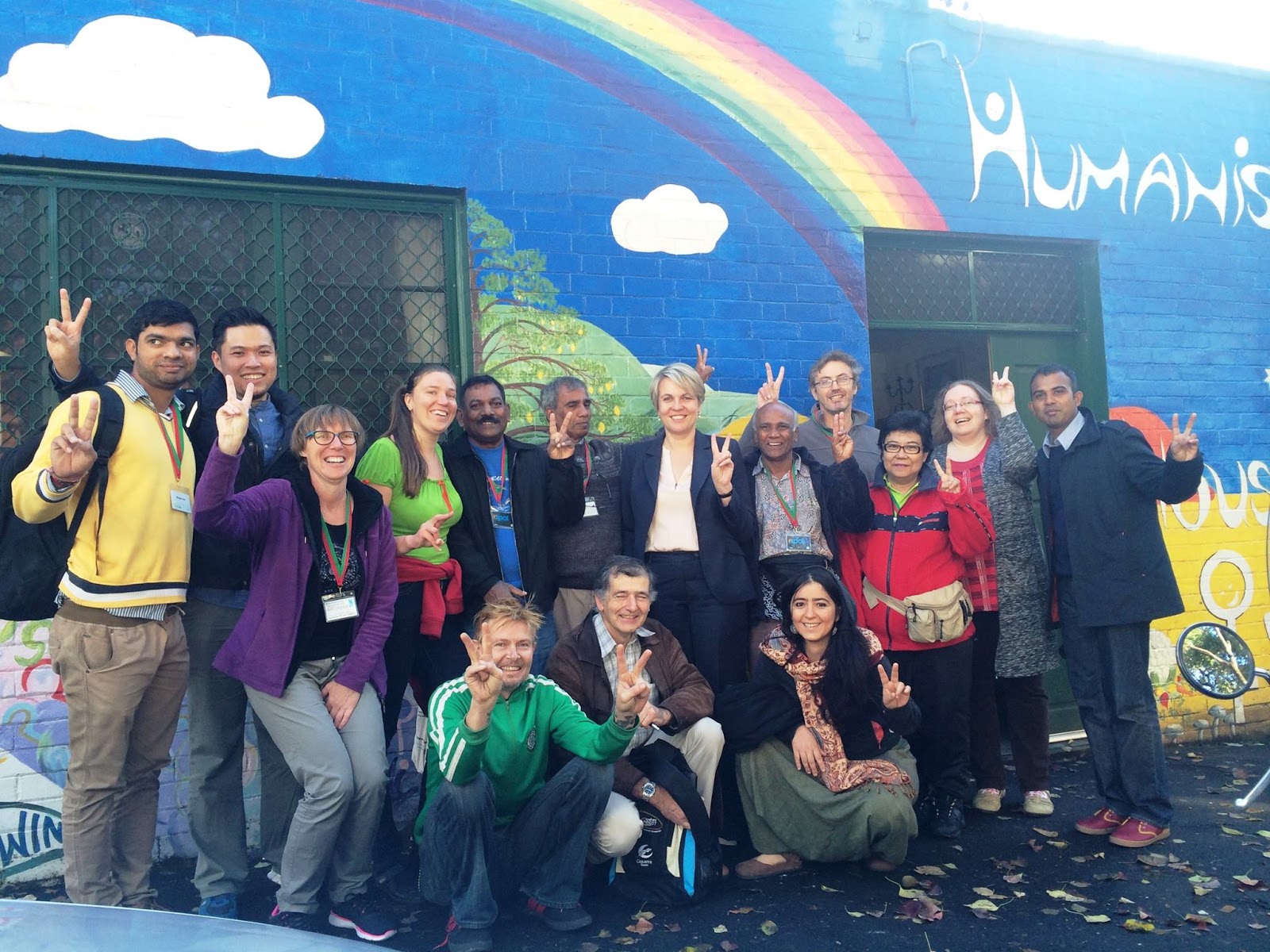
On the first day, we started with ice-breaking sessions, energisers and true SCI spirit, we had fun and got to know each other better, for some, meeting for the first time! Expectations on the seminar were also shared by the participants.
Francesco Volpini ex-Director CCIVS was the first speaker, he gave informative statistics and research findings relating to volunteering globally and the Asia Pacific region specifically. He also shared how this information can be used for our strategic planning in the future. Renjani from IVP Indonesia gave a presentation about Creative Advocacy with interesting videos and slides; it definitely stimulated some creative ideas among the participants. Thi Phuc Do shared information on the structure of NVDA and its activities. Newcomers had a special session too, thanks to Minerva Jormola for sharing information about SCI in general.
IVP Australia organized a public debate on International volunteering in a rapidly changing society in conjunction with this Global Volunteer Action seminar. This debate was an eye opener for all of us where 7 experienced speakers shared their views, experiences and research findings with the participants. The sessions saw active participation from the floor and lots of feedback was gathered. We left with positive learning points, new ideas to ponder and mind-provoking statements. Branches were given the chance to display information and posters/photos of their activities to be shared with others at the venue. We also took the opportunity to visit the Redfern Aboriginal Tent Embassy nearby to understand more on the situation and struggle of the evicted Aboriginals for low-cost accommodation at the area.
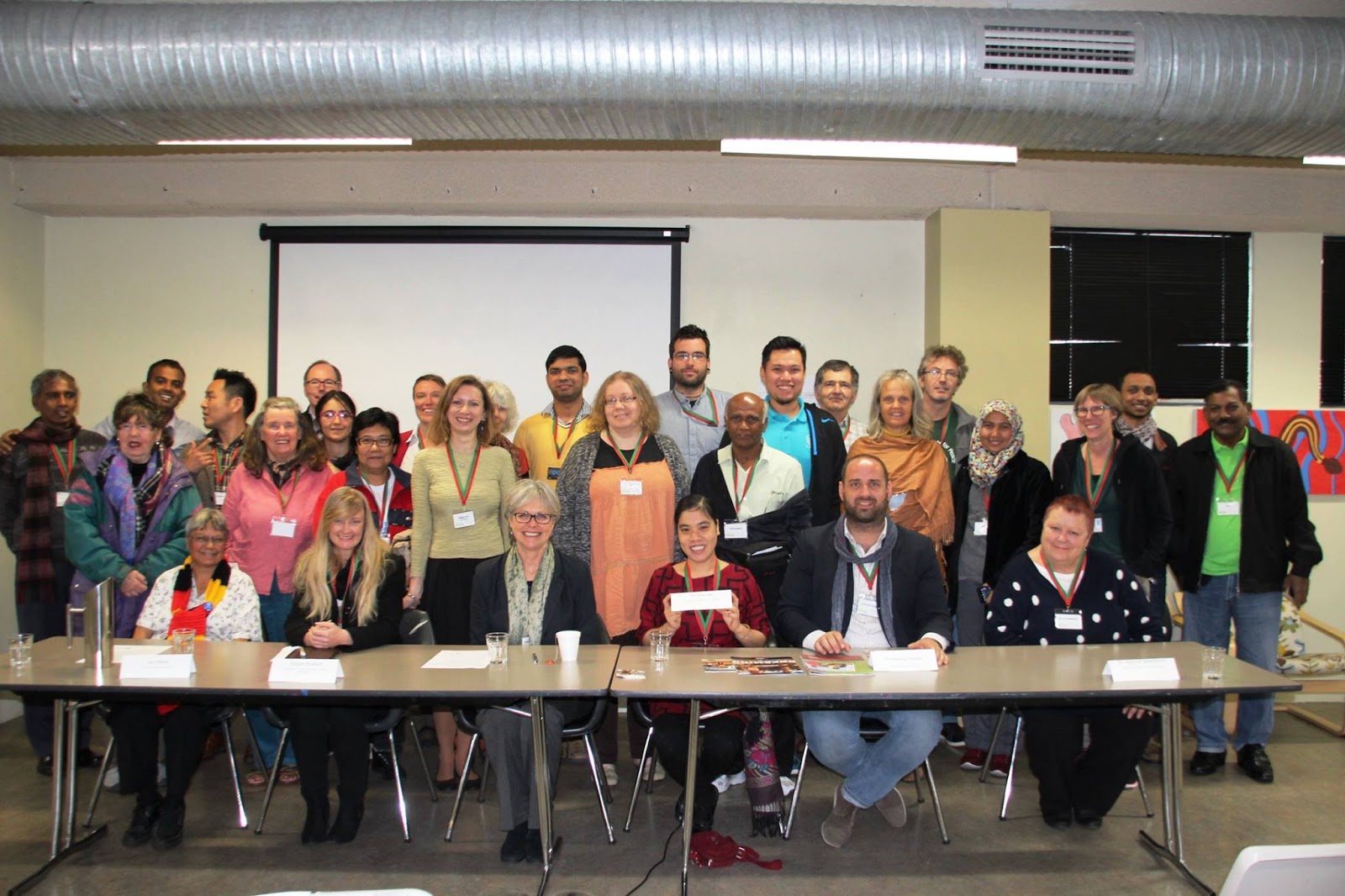
The remaining days of the seminar were focused on capacity building and strategic planning among branches particularly to strengthen Europe-Asia and Asia-Asia exchanges. Having said that, we did have a few sessions whereby Rita Sofea and Stephen Horn from IVP Australia gave an overview of their branch and the amazing work they have done, while Jimmy Kovacs explained the structure of IEC and gave a presentation on the GAIA micro-grant funding opportunities.
At the end of the seminar, a few plans of action (PoA) were finalised and agreed by all participants. This came about after many sessions of deliberating, discussing, dialogue and best practices sharing but all in the spirit of betterment for all branches. Everyone was committed to improve networking, communication and cooperation among SCI branches and partners in Europe and Asia.
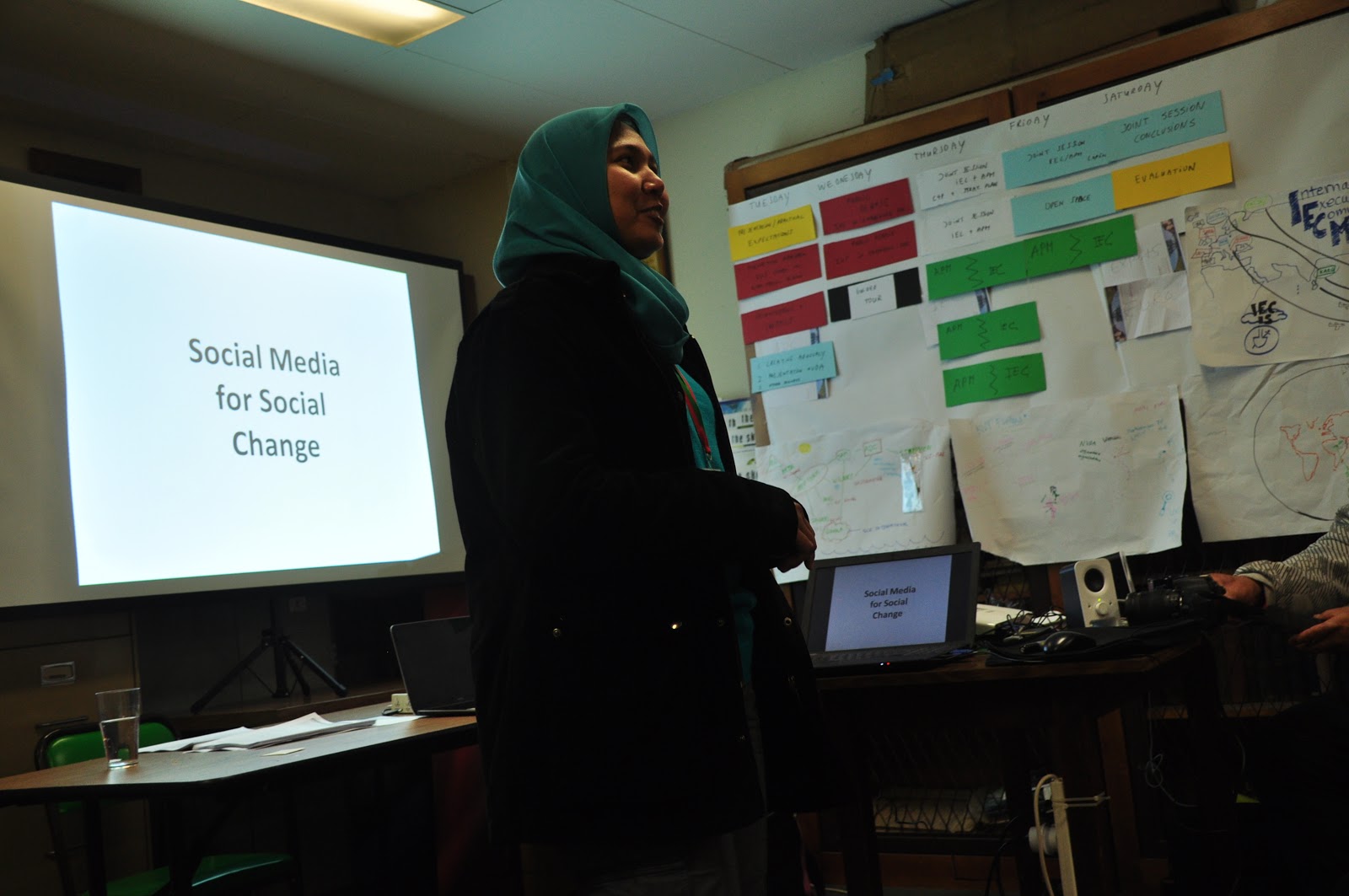
Last but not least, 15 of us joined the post-seminar cultural tour in Taralga, a small village in the Southern Tablelands of New South Wales. Stephen Horn was our very gracious host and welcomed us to his old stone farm house dating back to the 1830s, imagine that! The cultural tour was simply wonderful; we learnt about the rich history of Taralga, associated with early settlement, the importance IVP’s Stonequarry woodland regeneration project, heritage values of the village cemetery, the town museum, and to top it all off, there were kangaroos hopping freely everywhere!
All the efforts made by the Global Volunteer Action Opening Seminar prep team and IVP Australia, who made this seminar an amazing experience for all the participants, were sincerely appreciated.
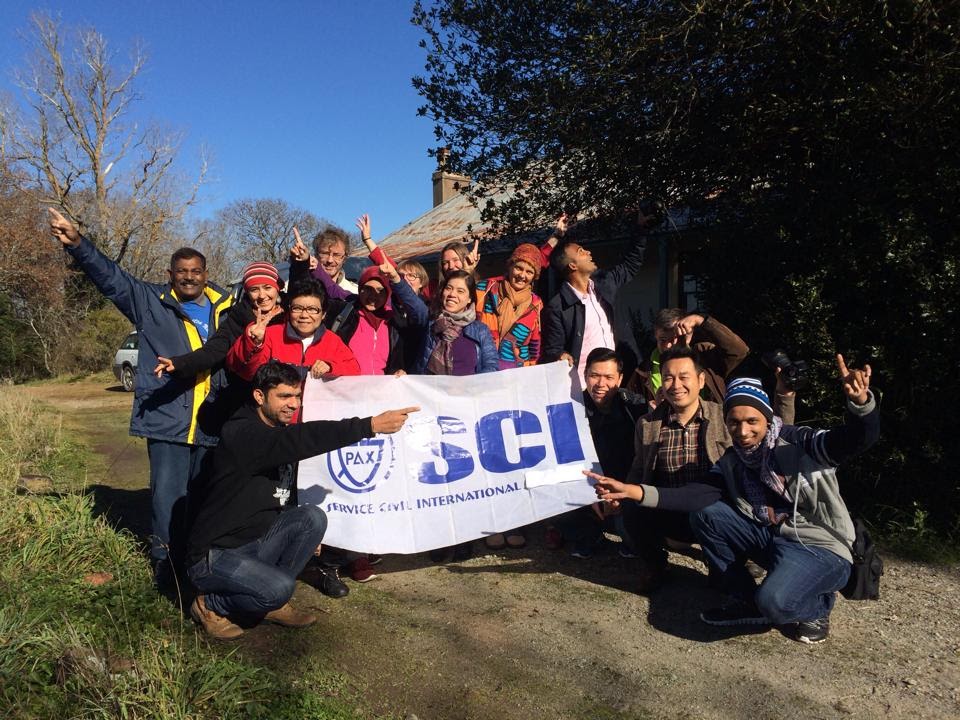
Article by Edward Chuah
Photos by Stephen Nah
Social Media and ICT Training
Hong Kong (China), 20 – 25 February 2016
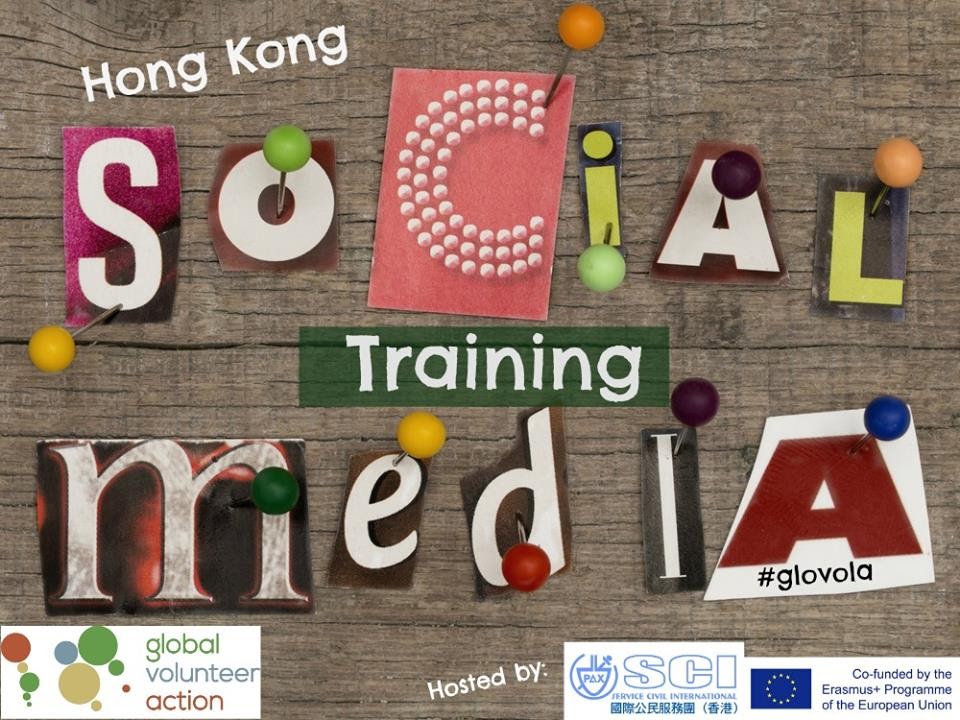
The poster shared on Social Media to announce the start of the training
Participants to the training share their reflections:
“The recent Global Volunteer Action social media training in Hong Kong was for me juggling with new terms and tools. Ever heard of Canva? Or fotor.com? Both are tools for creating images, the first one mainly meant to add text to the background of a picture, while fotor.com is to create collages.”
“This training was definitely very inspiring but also needed. We can create so much and have such a big impact with less effort, we only need such opportunities to learn new tools, share know-how, and to take the best out of it.”
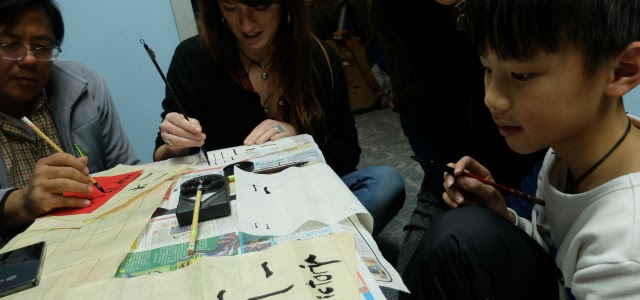
Participants from the training, “SCI Volunteering for Peace”, Hong Kong 2016
“It brought together a nice mix of representatives of Asian and European participants. We as participants could choose between four working-groups, photography, video, social media planning and content curation. Content what? Yes, also a new term, and as I joined that group, I must be able to explain it somehow. It is about finding, filtering, organizing and at the end publicizing information, mainly from other than your own direct sources.”
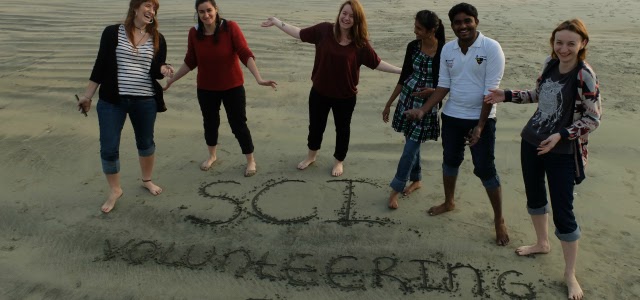
Participants from the training, “SCI Volunteering for Peace”, Hong Kong 2016
“Every day we were supposed to publish our progress on the SCI facebook page. This did not really happen as planned as we we were still in a learning phase and we had to get acquainted with the tools. The learning experience was however very useful, especially since we had the chance to support each other in making a social media planning for our own branches.”
“This training was a unique chance to meet with activists and volunteers from our Asian branches, we need more chances for cross continental cooperation, because somewhere in the middle the magic happens and we all make a bigger difference together. Besides, I completely fell in love with Asia.”
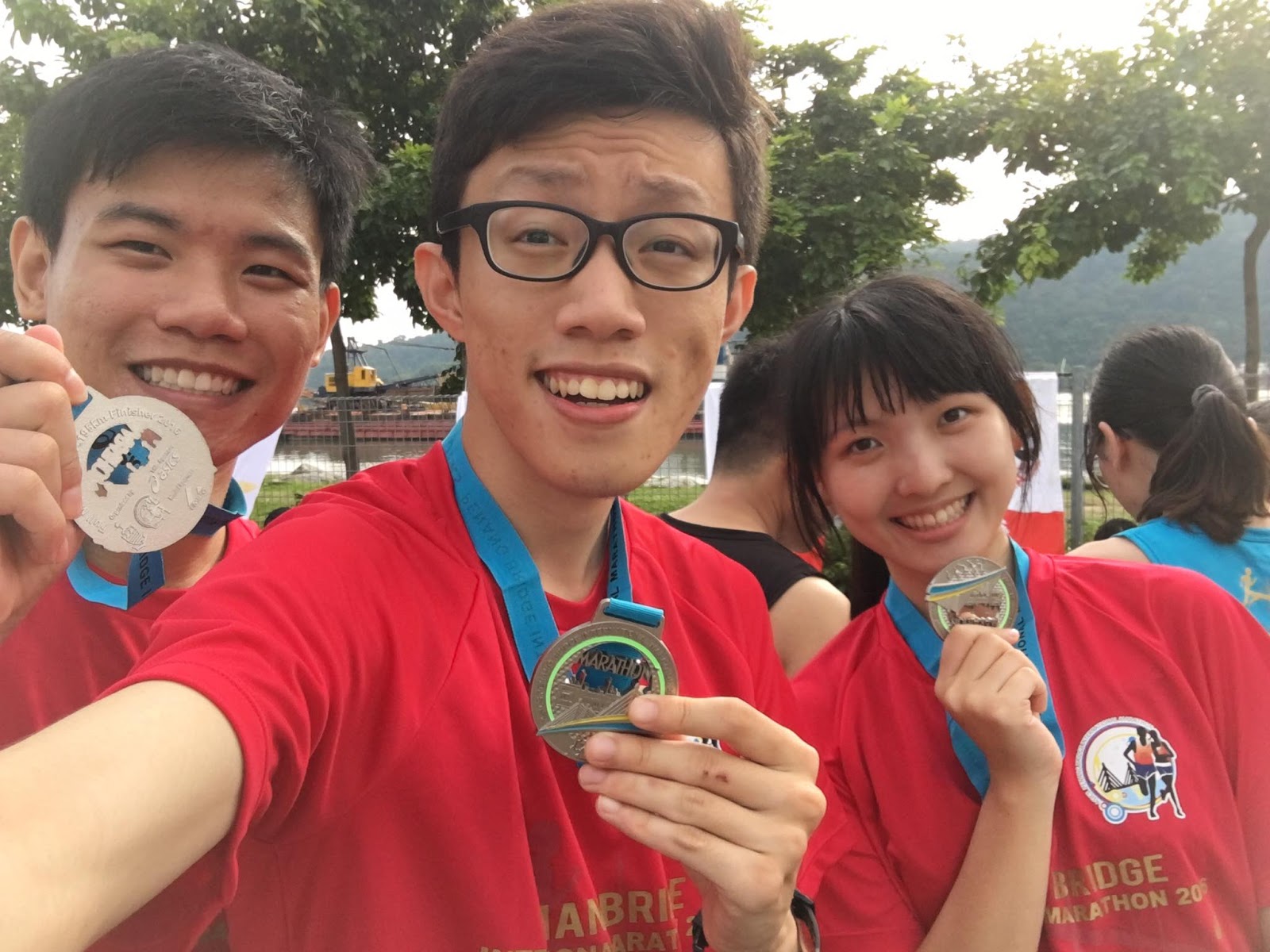
“One day we went to a secondary school in Hong Kong to act as living books for the students. I was so grateful to share with students about my own homeland, Malaysia. They shared about the lifestyle of Hong Kongese and the famous food there!”
Liew Shan Kun, also known as Sherlock, a participant of the Social Media Training
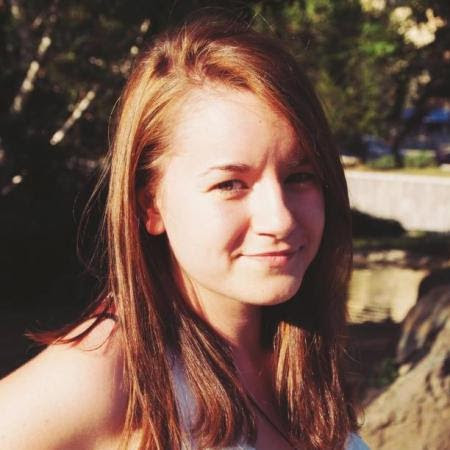
“This training was a unique chance to meet with activists and volunteers from our Asian branches, we need more chances for cross continental cooperation, because somewhere in the middle the magic happens and we all make a bigger difference together.”
Viktoriya Marinova, Bulgarian participant of the Social Media Training in Hong Kong
Training for multipliers working with (international) youth groups
Athens (Greece), 11 – 17 April 2016
The training of Campleader Trainers gathered 22 volunteers from Belgium, Bulgaria, Catalunya (Spain), Greece, Hong Kong (China), Hungary, India, Indonesia, Ireland, Italy, Malaysia, Poland and Sri Lanka. It was aimed at SCI volunteers and activists for the preparation of future coordinators of workcamps in various Countries around the world. The training was conducted by Malgorzata Tur and Natalia Jivkova, both professional trainers and part of SCI’s Pool of Trainers and Facilitators.
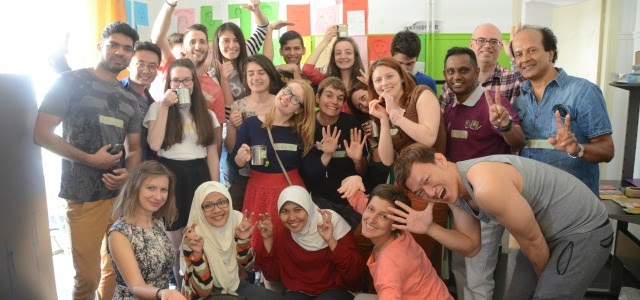
Training for Multipliers, Glovola Project, Athens, April 2016
The training was divided in 3 parts:
- The theoretical part:
How the human mind learns, the Kolb (cycle learning) and Tuckman (various types of group) models, the role of a trainer (qualities, abilities and weaknesses), the that of the volunteer, group dynamics and management, the importance of communication (experiment Mehrabian), flexibility and listening. - The practical part:
Many role games were used to better know ourselves and each other, models of intervention within a group with varying degrees of difficulty. - The comparison between volunteers and teamwork:
How the various branches of SCI work in their training courses for campleader, communication skills and preparation of training models.
At the end of each day a reflection session allowed participants to evaluate the meaning of the things learnt that will serve us in the future as educators of volunteers.
One important result of the training was putting together a plan of a camp leader training, including schedules, methods, energizers, activities and topics. More strategies were created based on the length of the training, that could be just a few hours for an urgent replacement or, ideally multiple days.
The group of participants was very close-knit and the diversity of volunteers (for age, experience and profession) allowed for creating new friendships. The afternoon tour of Athens was not to be missed, as well as the beach the evening before the departure and the visit to a home for refugees in the city center.
“Personally, this is the first time I participated in a training lasting a week and the occasion was very useful to acquire new knowledge and confront one another; the training has given to everybody new tools and a new incentive to act with enthusiasm, so to give a significant contribution to the growth of the SCI in various countries.”
Rosario Scollo, SCI Italy
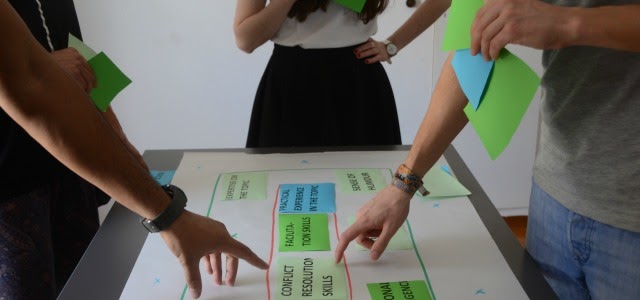
Training for Multipliers, Glovola Project, Athens, April 2016
“Imagine: you spend one week in a group where everybody seems to be very different. After a couple of hours you understand that you share the same values, open-minded, a peaceful and joyful heart and acceptance of diversity and everything flows in its natural, easy way. This was our training course in Athens, Greece in April.
SCI is an inspiring organization for people with these common values. Two outstanding, well-prepared trainers facilitated our program. Their enthusiasm reflected on their continuously positive energy level, that could be felt during the whole event. Natalie and Goska are extremely committed to the mission of SCI and built a close partnership to the participants.
As most of the participants were experienced in SCI workcamps, the trainers gave us space to unfold our creativity and to converge the experiences in a structured way. Every day we had energizers at the right moments (morning, after lunch, before a big session), group activities, individual tasks, and feedback sessions at the end of the day. Sessions covered topics like group dynamics, Kolb learning cycle, conflict situations, leadership styles. The variety of methods were on as wide a range as the colours we used to perform them: colourful pencils, papers, balls. We created an atmosphere together where everybody felt secure and could share their opinion freely. From my own perspective the highlight of the week was the practice of presentation skills: we had very limited time to prepare a short presentation about the introduction part of a camp leader training and perform it in a smaller group. I am happy that I was brought out of my comfort zone because it is always the best way to develop.
In all, I am sure that the impact of this event is even bigger: the quality of training courses will improve, workcamp participants will be happier, and there will be an increased popularity of SCI. What more could we ask for?”
Kinga Katona, Útilapu Hálózat – SCI Hungary
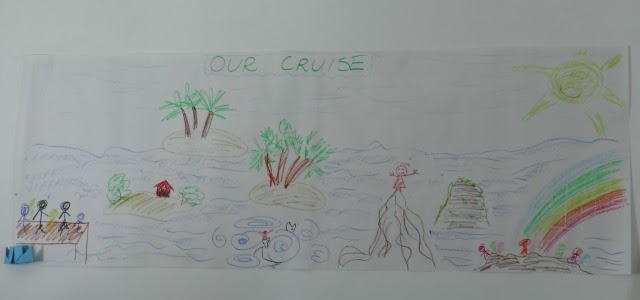
Training for Multipliers, Glovola Project, Athens, April 2016
“This story is about the great experience of going on training with SCI.We had our daily sessions at the sunny office of SCI Hellas and we had amazing trainers from SCI’s Pool of Trainers and Facilitators. For the first moment, when I had an amazing welcome from my roommate, I felt that it was going to be a great experience. Already on the first evening, when most of us had arrived, it was easy to reach each other and we were sharing personal stories and finding common topics to discuss that were enriched during the rest of the week. On the first official day of the training we realized that actually we are not on a training! We were heading on a cruise. A cruise that was supposed to send a bunch of people into the ocean of knowledge.
We visited the island of the training programs and the land of training secrets. We played poker with cards, showing us the most important qualities of a trainer. A lot of visualization methods and on-line applications were used and a lot of experience was shared. Not only from our trainers, but also from within the group. There weren’t secrets kept, everyone volunteered to share stories, to give examples from their own practices. This somehow led us to the tornado of group dynamics and we were learning live, on the spot. The dire straits of the challenging situations was another level to reach and pass successfully.
The result for me was gaining confidence and at the same time humility and respect to the reasons which may lead to such situations. Visiting the volcano of methods was a session with our own contributions and ideas. We had the chance to propose topics and share methods for exploring them: gender stereotypes were discussed, emotions were shown through a game, stressful situations and approaches to resolution during trainings or while leading a workcamps were shared. On the last day we were hiking in the mountain of presentation skills, armed with our cameras and our fresh and constructive feedback for every one of us who stayed in front of a group of people and was challenged to introduce in 3 minutes their own workshop. Of course I will not forget the free afternoon exploring the terra incognita called Athens with all the history, the beach and cozy local cafeterias. Some of us chose to explore and visit a refugee center in the city or museums and the Acropoli.
One of the greatest things in this training was that we often returned to the bay of reflections. We had the chance to summarize, think a little bit more and reflect within a group on a session, something that stood out for the whole day.
At the beginning we were a group of strangers, gathered from all around the world, who got on a boat and started a journey. Everyone had their own expectations and fears. During the cruise we all used and shared each other’s skills, transparent communication, open minds, support and fun attitude. At the end we landed, each of us in their own country, but this is actually a continuation to an even brighter future using all the tools we collected. And through advanced technologies, we will be able to stay in touch and support each other even from a distance and maybe meet again on the infinite land of voluntary projects.”
Shirin Hodzheva, CVS Bulgaria
Several training courses and workshops were organised by participants as a follow up of the Training for multipliers.
“There was a visible increase in their self-confidence as trainers and educators, and their soft skills significantly developed and improved. Additionally, at the end of the training, we felt them as being more curious and willing to continue learning and developing in the field.”
Goska Tur and Natalie Jivkova, trainers
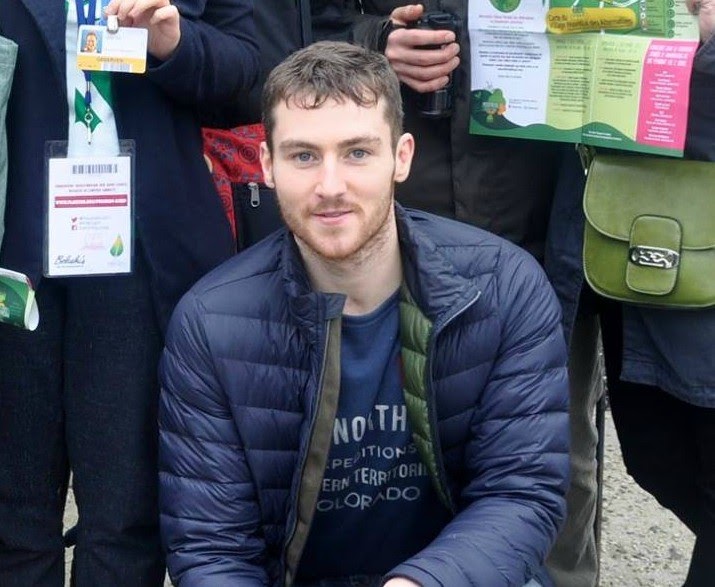
“The group discussions and role playing were great ways in which to learn new aspects of self-assertiveness. I very much enjoyed the back and forth role playing and acting out different scenarios that might take place during a workcamp.”
Shane Carolan, participant of a camp leader training organised as a follow up of Training for Multipliers
Final seminar – Advanced Volunteer University
Barcelona (Spain), 17 – 22 June 2016
Networking, capacity building, non-formal education and innovation in international youth and volunteer work
The project included seminars and gatherings between different networks of international volunteering organizations in Europe and Asia, and so made visible the possible synergies, challenges and objectives for future actions.
The program consisted of 6 days of seminars, meetings, workshops focused on the assessment of the whole Global Volunteer Action project. It also provided an opportunity for members of the IEC (International Executive Committee) of SCI, representatives from Asian and European branches and partner networks, the Board members of SCI Catalunya to explain more about their roles and responsibilities associated with the organisation and the project.
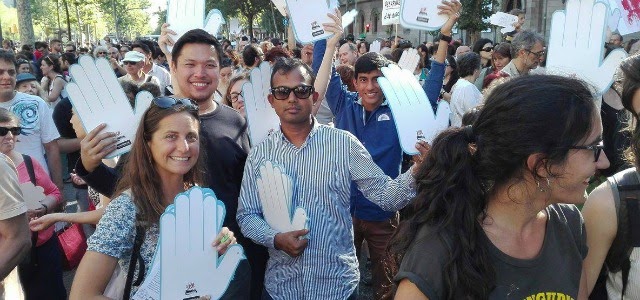
Photo taken during the Seminar, Catalunya, Glovola Project, 2016
On the first day, participants got to know each other better with an atmosphere filled with joy and excitement followed by a short session on the agenda for the coming days. A concrete plan was formulated on how the evaluation process was going to be carried out, focusing on the key aspects needed to be discussed. Participants worked in small groups, and shared expectations from the seminar. There was a discussion on networking, communication and cooperation among SCI branches and partners in Europe and Asia active in international voluntary service, working hand in hand with each other.
The second day of the meeting mainly focused on how this project facilitated the process of non-formal and informal learning opportunities for young people through the international voluntary service in both Europe and Asia (in particular on the topics of intercultural dialogue and solidarity), active citizenship and common global issues as social inclusion, youth employment, global environmental challenges and other. A summary on the activities that took place under this project was also shared.
On the third day, the results of the project, including the final toolkit, were presented to the Global meeting of IVS networks. There were inputs and contributions from the participants on their collective efforts to increase visibility and recognition of international volunteer and youth activities by better use of internet and social media tools on both national and international level, innovative and creative approaches in organizing international youth and volunteer activities. In the evening, the Global volunteer action evaluation group, the volunteers and sister networks of SCI joined a demonstration in Barcelona on the International Refugee Day raising our voice on the ongoing Refugee crisis.
The 4th day was devoted to increasing the quality of awareness raising and educational activities in international youth and volunteer projects.
The 5th day was one of the highlights of the week. There was a public event organized by SCI Catalunya: “Making a Difference by Volunteering: Impact and challenges of international volunteering”. This event aimed at analyzing the impact of the experiences that international volunteering have both on the volunteers themselves as well as on the local community that hosts them. Each year thousands of people participate in projects of international volunteering all around the world – but do we take a close enough look on the impact these experiences have on them and on the local communities? CCIVS, invited to join the table of speakers, presented a study called “Changing Perspectives”. From impact measurement to the recognition of international voluntary service” in order to answer these questions and to determine more profoundly all that is involved in international volunteering. The outcomes of the above mentioned study were presented by Oriol Josa and Matina Deligianni (CCIVS) and was further enhanced by the experiences in International volunteering of Abayomi Oyebade Oyekan (VWAN – Nigèria) and Hemamali Perera (SCI Sri Lanka). Examples illustrating the impact of volunteering on the local community were presented by David Llistar (Director of Global Justice and International Cooperation in the Ajuntament of Barcelona), Marta Rosique (area of cooperation of the Council of Youth in Catalonia), Clara Giberga (Servei Civil Internacional) and Pere Vidal (coordinator of the association ADeLA, Can Pipirimosca). The Global Volunteer Action project and its results were also presented, and its follow up, Peers to Peace, was announced with great enthusiasm.
Representatives of volunteering associations from Europe and Asia including Vietnam, Malaysia, Japan, Sri Lanka, Belgium and Germany, amongst others, were also present at the seminar. After this extraordinary event, there was an exciting Summer Dinner at the SCI Catalunya office.

